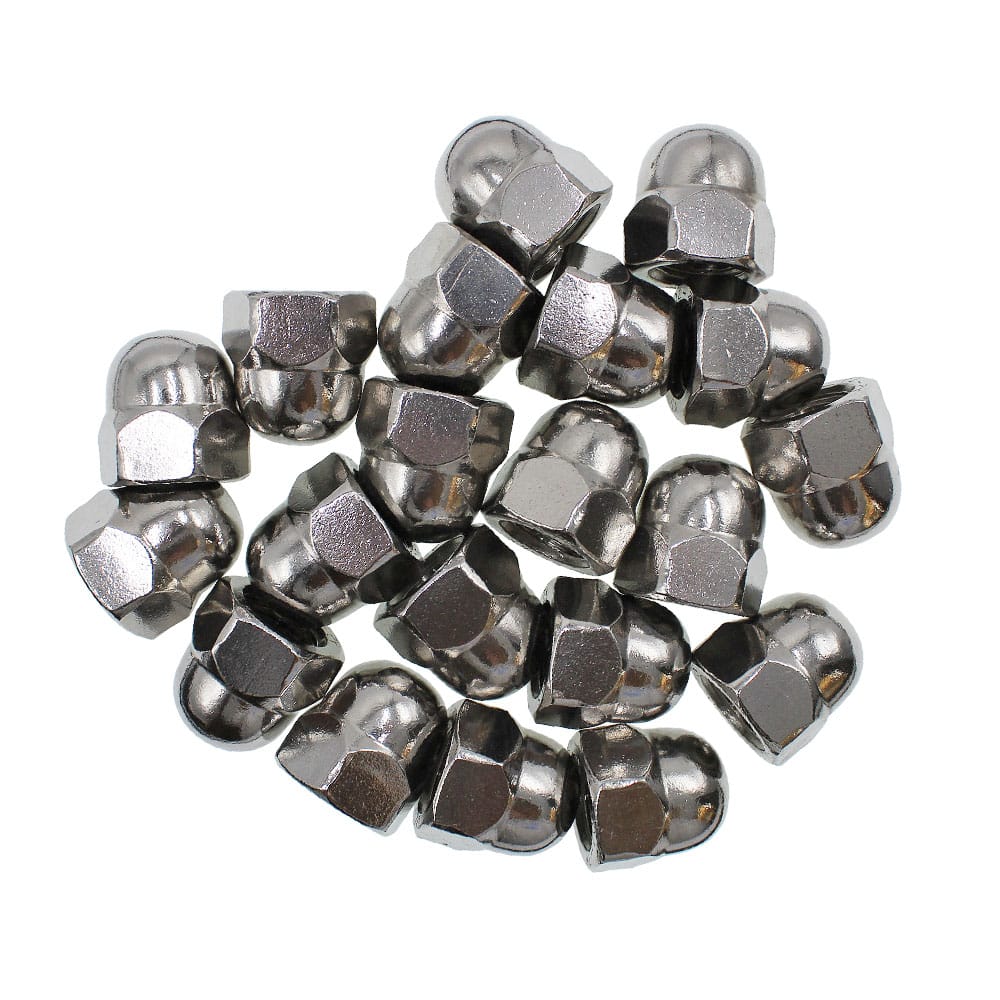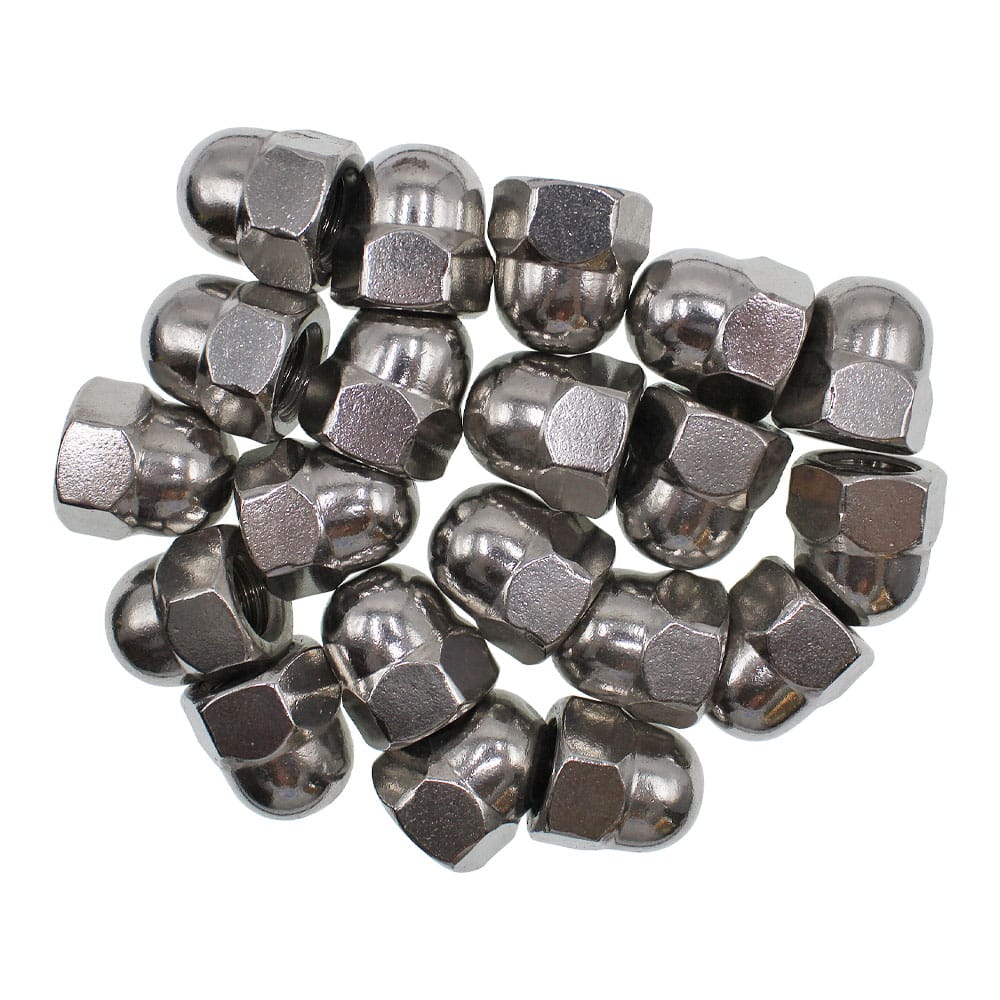- Massive Range
- FREE UK Delivery
- Rapid Dispatch
- Massive Range
- FREE UK Delivery
- Rapid Dispatch
- Massive Range
- FREE UK Delivery
- Rapid Dispatch
£6.19 – £127.04 inc VAT


This website is secured:
£ MULTIBUY SAVINGS – Order 3 For 10% Off
✔ Specialists In Rapid Shipments Of Any Size
✔ FREE UK Delivery Included
✔ Immediate Express Dispatch From Stock
✔ Tracked Delivery with Order Updates
✔ 30-Day Returns Accepted
@ ☏ Larger Pack Quantities Available
If you’re looking for a dome cap nut that will stand up to the toughest conditions and never let you down, the M18 A2 Stainless Steel Dome Cup Nut from Speciality Metals is the way to go. This top-quality nut is made from 304-grade stainless steel, which is known for its durability and versatility in a wide range of applications. Whether you’re working on your car, building a new piece of furniture, or working on any other project that requires a reliable dome cap nut, this item is sure to meet all your needs. And with its low maintenance design and corrosion-resistant properties, you can rest assured that it will be just as secure and dependable years from now as it is today. So why wait? Pick up your M18 A2 Stainless Steel Dome Cup Nut today and experience the difference for yourself!

This top quality stainless dome cap nut is supplied straight from Warrington, UK.
If you’re looking for a highly durable and versatile fastening solution, the M18 (18mm) A2 Stainless Steel Dome Cup Nut might be just what you’re looking for. 304 grade stainless steel construction ensures long-term use without frequent maintenance with this dome cap nut. Designed with corrosion resistance in mind, Speciality Metals’ product offers superior protection against harsh environments where rust and deterioration can be a major issue. Its secure design ensures that you can trust this nut to hold your project in place, providing both practicality and peace of mind.
Standard nuts are not as aesthetically pleasing as dome nuts.
Key product details:
Speciality Metals are the best suppliers for you because:
Speciality Metals is a trusted UK based distributor of fasteners, sheet metal, flat bar and round tube. We specialise in rapid delivery to any location around the country. Our team of experienced, friendly staff are at hand at all times to process your order.
Stainless Steel 304 dome nuts have a decent resistance to high-temperature applications, but their performance can vary depending on various factors such as the specific temperature, duration of exposure and the type of load they will bear. Generally, 304-grade stainless steel can withstand temperatures up to approximately 870°C (1600°F) in intermittent service and up to 925°C (1700°F) in continuous service.
However, there are some things to consider:
Strength Reduction: Mechanical properties like tensile strength can degrade at high temperatures, potentially leading to failure.
Intergranular Corrosion: 304-grade is susceptible to intergranular corrosion if exposed to temperatures between approximately 425°C and 860°C (800°F and 1600°F), especially in corrosive environments.
Oxidation: While stainless steel is resistant to oxidation, it can still occur at high temperatures, leading to the formation of a thin oxide layer.
Creep Resistance: At high temperatures, the material can experience “creep,” a slow, permanent deformation over time under mechanical stress. This could be a concern in load-bearing applications.
Specific Application: The suitability of 304-grade stainless steel for high-temperature applications also depends on other environmental conditions it may be exposed to, such as corrosive substances.
Manufacturer Guidelines: Always check the manufacturer’s technical data sheets for temperature-related performance specifications.
Routine Wiping: For most indoor applications, a simple wipe-down with a dry cloth to remove dust is usually sufficient.
Mild Detergent: In more demanding environments like kitchens or bathrooms, a mild detergent and warm water can be used to clean the nuts. Rinse thoroughly with clean water afterward.
Specialised Cleaners: For industrial applications or environments with specific contaminants, specialised stainless steel cleaners may be required.
Rinse and Dry: After any wet cleaning, make sure to rinse the nuts thoroughly with clean water and dry them to prevent water spots or potential corrosion.
Check Tightness: Periodically check the tightness of the nuts, especially if they are used in mechanical or load-bearing applications.
Inspect for Corrosion: While 304-grade stainless steel is corrosion-resistant, it is not entirely immune, especially in harsh environments. Regularly inspect for signs of corrosion and replace if necessary.
Lubrication: If the dome nuts are part of moving assemblies, periodic lubrication might be necessary to reduce wear. However, make sure to use a lubricant compatible with stainless steel.
Retightening: In some applications, it might be necessary to retighten the nuts after a “break-in” period or due to thermal expansion and contraction.
Replace Damaged Nuts: If you notice any signs of damage, including stripped threads or visible corrosion, replace the nuts immediately.
Yes, Stainless Steel 304 dome nuts are recyclable. Stainless steel is one of the most recycled materials in the world, with a recycling rate of more than 60%. The 304 grade, in particular, is highly sought after in recycling programs because it does not degrade or lose its properties during the recycling process. This makes it a sustainable option for various applications. Recycling stainless steel is both economically viable and environmentally friendly, as it reduces the need for raw materials and energy consumption in steel production. In fact, many stainless steel products, including dome nuts, contain a significant percentage of recycled content. So, if you’re looking to make an eco-friendly choice, Stainless Steel 304 dome nuts not only offer durability and corrosion resistance but also the benefit of being recyclable at the end of their useful life.
Material Compatibility: Ensure that the material you are welding the 304-grade dome nut to is compatible. Typically, welding 304 stainless steel to another 304-grade material is straightforward.
Preparation: Make sure the surfaces to be welded are clean and free from any contaminants, such as oil or grease, as these can adversely affect the quality of the weld.
Welding Process: Common methods for welding 304 stainless steel include TIG (Tungsten Inert Gas) and MIG (Metal Inert Gas) welding. The choice of method may depend on the specific application and equipment available.
Heat Tint: Welding can cause a heat tint or oxidation layer to form on the stainless steel, which could reduce its corrosion resistance. Post-weld cleaning is often required.
Intergranular Corrosion: While 304 is less susceptible to intergranular corrosion compared to other grades, it’s still a concern when the material is subjected to high temperatures for extended periods. The use of low-carbon 304L can mitigate this risk.
Mechanical Properties: The area around the weld may experience changes in mechanical properties, like reduced tensile strength. This needs to be considered if the nut is to be used in a load-bearing application.
Expert Consultation: If the dome nut is to be used in a critical application, it’s advised to consult a welding expert or materials engineer to ensure the integrity of the weld.
Safety: Always follow safety guidelines when welding, including using appropriate personal protective equipment like welding helmets and gloves.
Post-Weld Inspection: After welding, a visual and, if necessary, non-destructive inspection should be performed to ensure the quality of the weld.
Stainless Steel 304 dome nuts have moderate resistance to saltwater (marine environments) but are not the best choice for prolonged exposure to such conditions. While they offer better corrosion resistance compared to regular steel or other low-grade stainless steel types, they are still susceptible to pitting and crevice corrosion in saltwater.
Chloride Ion Presence: Saltwater contains chloride ions, which can penetrate the protective oxide layer of stainless steel, potentially leading to localised pitting or crevice corrosion.
Stress Corrosion Cracking: 304-grade stainless steel is also susceptible to stress corrosion cracking in chloride-rich environments, particularly at elevated temperatures.
Material Alternatives: For applications that demand higher resistance to saltwater, 316-grade stainless steel, which has molybdenum added to its composition, may be a more suitable choice.
Environmental Factors: The rate of corrosion can be influenced by other environmental factors like temperature, oxygen levels and water flow rates. Stagnant or low-flow conditions can accelerate crevice corrosion.
Regular Maintenance: If 304-grade stainless steel dome nuts must be used in saltwater environments, regular maintenance and inspections are essential to catch and address any signs of corrosion early.
Coating or Plating: Protective coatings or surface treatments can improve the saltwater resistance of the dome nuts, but these come with their own limitations and need for regular inspection.
Consult Manufacturer: Always check the manufacturer’s guidelines for material limitations and recommendations for use in marine or saltwater environments.
Check out our blogs discussing A2 stainless steel dome nuts. It will prove a useful read to help you to make an informed decision on which material would work best for you.
We are also very proud of our ever expanding YouTube channel.
Our goal for our blogs, videos and help guides is to answer as many questions as possible to help to explain the possibilities of mesh to our customers. Contact us today if you have any questions at all. We are always really keen to help in any way that we can.
We are also very proud of our highly popular eBay store, check us out there too.
Thank you for checking out our product.


Speciality Metals
Unit 1, Farrell Street, Warrington,
Cheshire, WA1 2WW, United Kingdom
Quick Links
Payment Options
